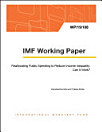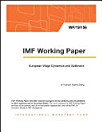Distributional Consequences of Fiscal Consolidation and the Role of Fiscal Policy: What Do the Data Say?
ruj 2013. · International Monetary Fund
E-knjiga
37
str.
reportOcjene i recenzije nisu potvrđene Saznajte više
O ovoj e-knjizi
The 2007-09 Great Recession has led to an unprecedented increase in public debt in many countries, triggering substantial fiscal adjustments. What are the distributional consequences of fiscal austerity measures? This is an important policy question. This paper analyzes the effects of fiscal policies on income inequality in a panel of advanced and emerging market economies over the last three decades, complemented by a case study of selected consolidation episodes. The paper shows that fiscal consolidations are likely to raise inequality through various channels including their effects on unemployment. Spending-based consolidations tend to worsen inequality more significantly, relative to tax-based consolidations. The composition of austerity measures also matters: progressive taxation and targeted social benefits and subsidies introduced in the context of a broader decline in spending can help offset some of the adverse distributional impact of consolidation. In addition, fiscal policy can favorably influence long-term trends in both inequality and growth by promoting education and training among low- and middle-income workers.
Ocijenite ovu e-knjigu
Recite nam što mislite.
Informacije o čitanju
Pametni telefoni i tableti
Instalirajte aplikaciju Google Play knjige za Android i iPad/iPhone. Automatski se sinkronizira s vašim računom i omogućuje vam da čitate online ili offline gdje god bili.
Prijenosna i stolna računala
Audioknjige kupljene na Google Playu možete slušati pomoću web-preglednika na računalu.
Elektronički čitači i ostali uređaji
Za čitanje na uređajima s elektroničkom tintom, kao što su Kobo e-čitači, trebate preuzeti datoteku i prenijeti je na svoj uređaj. Slijedite detaljne upute u centru za pomoć za prijenos datoteka na podržane e-čitače.








